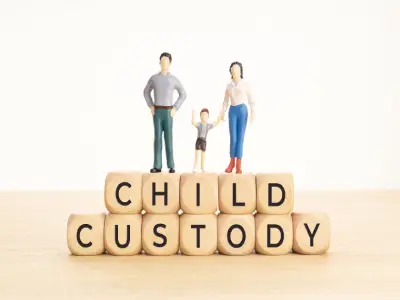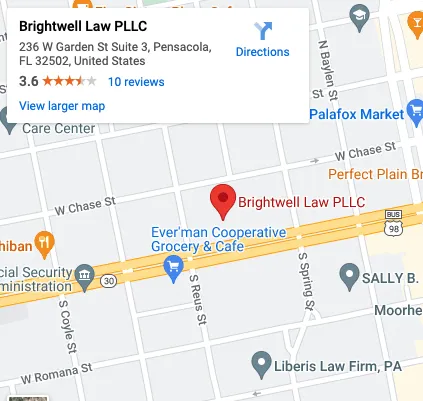Top Pensacola Child Custody Lawyer
Getting full custody of your child can be rough. The process becomes even more difficult if your ex-spouse has been uncooperative and distant. Do you have an aggressive ex? Don’t worry; our Pensacola child custody lawyer is well-equipped to prepare a powerful argument in your favor.
Brightwell Law PLLC can help if you want full custody of your kids. Call us now and learn more about what a competent child custody attorney in Pensacola can do for your family.
Why Do I Need a Pensacola Child Custody Lawyer?
When you need a child custody lawyer in Pensacola, you want someone who will:
- Be easy to work with;
- Understands your needs; and
- Put your children’s best interests first.
At the law office of Brightwell Law PLLC, our attorneys consider it an honor to represent both mothers and fathers in child custody cases. Our lawyers are committed to helping families with all their family law needs.
We know how stressful family law cases can be, especially when children are involved. Our primary goal is to help you reach the best possible outcome for your children.
A child custody lawyer in Pensacola at Brightwell Law PLLC will do everything to help you through this challenging period. Reach out today!
What is Child Custody?
 In a Florida divorce or child custody proceeding, the judge will consider the best interests of the children when determining how time-sharing will be divided between the parents. See Florida Statute 61.13.
In a Florida divorce or child custody proceeding, the judge will consider the best interests of the children when determining how time-sharing will be divided between the parents. See Florida Statute 61.13.
The Florida custody statute gives neither moms nor fathers any preference when determining child custody. Instead, the custody arrangement will be determined by the particulars of each case.
In Florida child custody cases, a child custody attorney is not essential but can be highly useful. A family law attorney in Pensacola can assist you in navigating the court system and advocating on your behalf. If litigation is necessary, the judge will decide the case based on the children’s best interests. It would be optimal to have completed all fundamental steps and presented a persuasive case before the judge.
A Summary of Florida's Custody Laws
A judge must decide both time sharing (parenting time or visitation) and parental responsibility (decision-making authority) over a child in a Florida custody dispute.
Parenting Time
“Time-sharing” refers to the time spent by a parent with their child. When a court decides on a time-sharing child custody schedule, they establish the parents’ visitation and custody schedules. In Florida, parents can enjoy equal time sharing.
In some places, this arrangement may be referred to as “shared custody.” Alternatively, a judge may provide one parent significantly more time with the child than the other — a situation frequently referred to as “sole custody” or “majority time-sharing.”
Evidence of domestic violence, child abuse, abandonment, or neglect may result in the loss of time-sharing or visitation privileges. See Fla. Stat. § 61.125 (2020.) A judge may also impose supervised time sharing if the kid’s safety is at risk.
Parental Responsibility
Parental responsibility is the right of each parent to make crucial medical, educational, religious, and legal decisions on behalf of the kid. Florida laws support shared parental responsibilities. A judge may award sole decision-making authority to one parent if dual parental responsibility would be detrimental to the child’s welfare.
Even when parents share parenting time and parental obligations, one parent will be recognized as the “primary parent” or “custodial parent,” and the other parent will be designated as the “secondary parent” or “non-custodial parent.” In Florida, the custodial parent is typically the parent who spends the most time with the child. When the parents cannot agree on an issue impacting the child, this parent gets the last say.
What is Legal Custody?
Legal custody is distinct from physical custody. It refers to the authority to make choices on a child’s upbringing in terms of religion, health care, and education.
What is Physical Custody?
Physical custody pertains to the child’s principal residence and who is generally responsible for providing their daily care.
What is Joint Custody?
The most typical type of joint custody is joint legal custody. One parent is granted primary physical custody (the child resides with them), and the other is usually granted visitation privileges. Joint custody is also when the parents have legal control over the primary choices affecting the kid when they share custody.
What is Joint Legal Custody?
Joint legal custody suggests that neither parent’s rights are more important than the other’s, and both parents retain equal legal rights about their child(ren). Joint legal custody necessitates continual discussion and decision-making between the parents while carefully resembling a nuclear family. Both parents must discuss the following about the child’s:
- Health,
- Education,
- Religious upbringing,
- Extracurricular activities,
- Summer activities,
- Discipline, curfews for school evenings and weekends, and
- Driving age.
No parent, whether custodial or non-custodial, has a claim on choosing their child’s church or school. You can get guidance from our Pensacola family law attorney on choices involving shared legal custody.
How Does Divided Custody Work?
With shared or divided custody, the parents may share legal custody, or each parent may have sole decision-making power over the child in their care.
Should a Single Mother File a Custody Request?
While some jurisdictions assume that unmarried moms automatically have custody of their children, certain states require unmarried mothers to apply for custody. To determine if you must formally file for custody, familiarize yourself with the child custody laws in your state.
How is Child Support Settled in a Divorce?
In child custody agreements, responsibility can be established in one of two ways.
- Mutual Consent – You and your spouse should propose a fair and reasonable strategy together. Try to set aside your marital disagreements to provide for your child’s needs with the least amount of conflict and anger possible.
- Court – If you and your spouse cannot agree on child custody by yourselves, the courts will decide on your behalf.
What Should Be Included in a Parenting Plan?
A parenting plan is a comprehensive strategy for dealing with the numerous custody difficulties you will face after your divorce. Among the most typical are:
- Legal custody
- Physical custody
- Visitation
- Vacation schedules
- Schedules for extracurricular activities
- Health coverage
- Considerations for Child Support
Call our Trusted Pensacola Child Custody Lawyer Now!
Child custody issues can be time-consuming and tough to navigate. Poorly written agreements often confuse long legal battles and heartache for everyone involved.
Brightwell Law PLLC is recognized as one of Florida’s premier family law firms. Our Pensacola child custody lawyer’s expertise is unmatched by any other attorney or legal team in the area. We can help guide you through your family law matter confidently and effortlessly.
Pensacola families feel secure knowing they can trust our attorneys and staff to be fully committed to their cause while remaining sensitive to their needs during this challenging time.
Schedule your consultation today!


